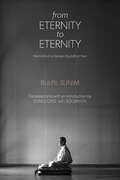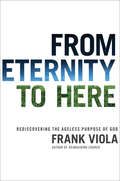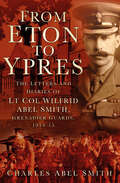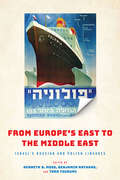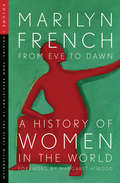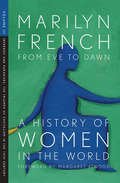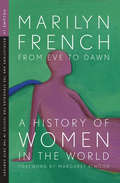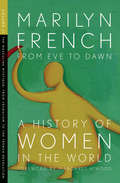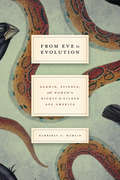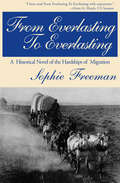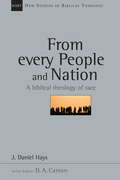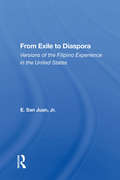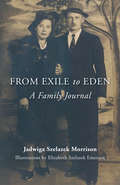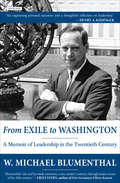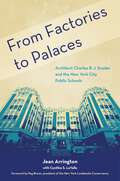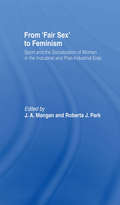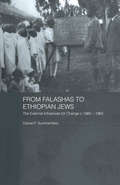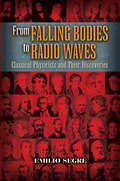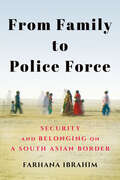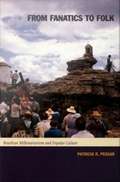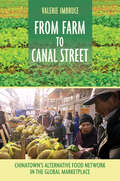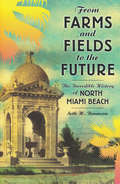- Table View
- List View
From Eternity to Eternity: Memoirs of a Korean Buddhist Nun
by Bulpil SunimFrom Eternity to Eternity is the story of Bulpil Sunim, arguably the most respected female Seon (Zen) master in Korea. Written with candor and an unpretentious sense of humor, her memoir provides both a fascinating record of her life and a deeply accessible window into Buddhist thought and spirituality. Describing and reflecting on her own experience of meditation and her journey as a woman in a male-dominated religious practice, she reveals the largely unknown realities of female monastic life in Korea. She also provides an unprecedented glimpse into her relationship with her father, the legendary Seon Master Seongcheol Sunim, who was widely considered a living Buddha in Korea. This lyrical autobiography, the first of its kind in Korean Buddhist literature, offers readers a chance to learn about Korean Seon meditation and practice from a woman’s perspective and will be of interest not only to scholars of Buddhism but to general readers curious about Buddhism, the experiences of religious women, or simply the remarkable life of a great spiritual leader.
From Eternity to Here: Rediscovering the Ageless Purpose of God
by Frank ViolaDiscover the sweeping story of God's eternal plan. Deep within God's Word lies a wondrous story like no other. A drama that unfolded before time began. An epic saga that resonates with the heartbeat of God. A story that reveals nothing less than the meaning of life and God's great mission in the earth.From Here to Eternity presents three remarkable stories spanning from Genesis to Revelation. Each story traces a divine theme that is woven throughout scripture. Seen together, they offer an extraordinary glimpse into God's highest passion and grand mission. What you discover will forever change your view of life, the church, and our magnificent God.
From Eton To Ypres: The Letters And Diaries Of Lt Col Wilfrid Abel Smith, Grenadier Guards, 1914-15
by Charles SmithRegarded as one of the most outstanding commanding officers on the Western Front, Wilfrid Abel Smith commanded an elite unit of 1,000 of the finest soldiers in the British Army. Educated at Eton and Sandhurst, Smith was a career soldier who led his battalion of Grenadiers with distinction through the First Battle of Ypres and the winter trench warfare of 1914–15. He died of wounds received at the Battle of Festubert in May 1915.The letters and diaries provide a vivid, first-hand account of the fighting and suffering on the front line, written by a compassionate commander and affectionate family man. Most of his brother officers were Old Etonians, including his brigade commander, Lord Cavan, and his second-in-command, George ‘Ma’ Jeffreys. Smith’s account offers a poignant insight into the way in which the privileged world of a Guards officer responded, with the highest sense of duty and courage, to the unprecedented demands of industrial warfare.From Eton to Ypres is edited by his great-grandson, Charles Abel Smith.
From Europe's East to the Middle East: Israel's Russian and Polish Lineages (Jewish Culture and Contexts)
by Kenneth B. Moss, Benjamin Nathans and Taro TsurumiThe overwhelming majority of Jews who laid the foundations of the Israeli state during the first half of the twentieth century came from the Polish lands and the Russian Empire. This is a fact widely known, yet its implications for the history of Israel and the Middle East and, reciprocally, for the history of what was once the demographic heartland of the Jewish diaspora remain surprisingly ill-understood.Through fine-grained analyses of people, texts, movements, and worldviews in motion, the scholars assembled in From Europe's East to the Middle East—hailing from Europe, Israel, Japan, and the United States—rediscover a single transnational Jewish history of surprising connections, ideological cacophony, and entangled fates. Against the view of Israel as an outpost of the West, whether as a beacon of democracy or a creation of colonialism, this volume reveals how profoundly Zionism and Israel were shaped by the assumptions of Polish nationalism, Russian radicalism, and Soviet Communism; the unique ethos of the East European intelligentsia; and the political legacies of civil and national strife in the East European "shatter-zone." Against the view that Zionism effected a complete break from the diaspora that had birthed it, the book sheds new light on the East European sources of phenomena as diverse as Zionist military culture, kibbutz socialism, and ultra-Orthodox education for girls. Finally, it reshapes our understanding of East European Jewish life, from the Tsarist Empire, to independent Poland, to the late Soviet Union. Looking past siloed histories of both Zionism and its opponents in Eastern Europe, the authors reconstruct Zionism's transnational character, charting unexpected continuities across East European and Israeli Jewish life, and revealing how Jews in Eastern Europe grew ever more entangled with the changing realities of Jewish society in Palestine.
From Eve to Dawn: From Prehistory to the First Millennium (Origins #1)
by Marilyn FrenchThe first volume of the New York Times–bestselling author&’s monumental and unprecedented history: &“Consistently thought-provoking&” (The New York Review of Books). The internationally celebrated author of The Women&’s Room, Marilyn French spent over fifteen years with a team of researchers and prominent historians examining women&’s lives and activities in civilizations and societies spanning the ages. Beginning in prehistory, Origins moves on to examine women&’s lives in ancient Egypt, China, India, Peru, Mexico, Greece, and Rome. In her reconstruction of wars, laws, and other activities affecting both women and men, French also traces the worldviews underpinning them. She also depicts how women&’s relationship to Judaism, Christianity, and Islam changed for good and bad over the centuries. &“She backs up even her more controversial theories with an impressive accumulation of academically accepted historical, anthropological and sociological sources . . . Written in concise, understated language, this is a significant addition to literature on women&’s studies and history.&” —Publishers Weekly
From Eve to Dawn: Infernos and Paradises: The Triumph of Capitalism in the 19th Century (Origins #3)
by Marilyn FrenchFrom the New York Times–bestselling author: &“A rare find: a page-turning, can&’t-put-it-down history text.&” —Library Journal Writing about what she calls the &“most cheering period in female history,&” Marilyn French recounts how nineteenth-century women living under imperialism, industrialization, and capitalism nonetheless organized for their own education, a more equitable wage, and the vote. Focusing on the United States, Great Britain, and countries in Africa, French argues that capitalism&’s success depended on the exploitation and enslavement of huge numbers, including women, but the act of working outside the home alongside other women, rather than in isolation, provided women with the possibility of organizing for emancipation. &“The third volume of her remarkable four-volume survey . . . fascinating insight and detail.&” —Publishers Weekly
From Eve to Dawn: Revolutions and the Struggles for Justice in the 20th Century (Origins #4)
by Marilyn FrenchThe conclusion of the &“remarkable&” four-volume history by the New York Times–bestselling author of The Women&’s Room (Publishers Weekly). In the twentieth century, women became a force for change, in part through suffrage, and in part through mass organizing. This final volume of Marilyn French&’s wide-ranging survey offers a vibrant history of multiple political revolutions as well as the century&’s horrors—including genocides and the atom bomb. It ends with a thoughtful investigation into the various indigenous feminist movements throughout the world and asks what these peaceful revolutions might augur for the future. Eschewing easy answers, French suggests that the defining moral moments of the twenty-first century should, and will, build from a global human rights agenda.
From Eve to Dawn: The Masculine Mystique from Feudalism to the French Revolution (Origins #2)
by Marilyn French&“Filled with fascinating detail . . . this second volume of French&’s massive and valuable work is an example of scholarship and clear vision.&” —Publishers Weekly This volume of New York Times–bestselling author Marilyn French&’s monumental history analyzes and evaluates the lives of women in societies around the world between feudal times and the French Revolution. Drawing upon fifteen years of collaboration with a team of researchers and prominent historians, the volume opens with fascinating chapters comparing medieval Europe and Japan, disparate cultures which nevertheless shared traditions of male dominated aggression and competitiveness. French then shows how, in Europe, this tradition led to colonialism and imperialism, and the horrific subjugation of indigenous societies, just as women were subjugated in the conquerors&’ home countries. As French makes clear in this impassioned women&’s history, only with the French Revolution did the political force women exerted powerfully change the course of history. &“French gives us grand theory at its best, wading through copious amounts of scholarly data on the histories of civilizations and offering up, in readable prose, an important synthesis.&” —Library Journal
From Eve to Evolution: Darwin, Science, and Women's Rights in Gilded Age America
by Kimberly A. HamlinFrom Eve to Evolution provides the first full-length study of American women’s responses to evolutionary theory and illuminates the role science played in the nineteenth-century women’s rights movement. Kimberly A. Hamlin reveals how a number of nineteenth-century women, raised on the idea that Eve’s sin forever fixed women’s subordinate status, embraced Darwinian evolution—especially sexual selection theory as explained in The Descent of Man—as an alternative to the creation story in Genesis. Hamlin chronicles the lives and writings of the women who combined their enthusiasm for evolutionary science with their commitment to women’s rights, including Antoinette Brown Blackwell, Eliza Burt Gamble, Helen Hamilton Gardener, Charlotte Perkins Gilman, and Elizabeth Cady Stanton. These Darwinian feminists believed evolutionary science proved that women were not inferior to men, that it was natural for mothers to work outside the home, and that women should control reproduction. The practical applications of this evolutionary feminism came to fruition, Hamlin shows, in the early thinking and writing of the American birth control pioneer Margaret Sanger. Much scholarship has been dedicated to analyzing what Darwin and other male evolutionists had to say about women, but very little has been written regarding what women themselves had to say about evolution. From Eve to Evolution adds much-needed female voices to the vast literature on Darwin in America.
From Everlasting to Everlasting
by Sophie FreemanAs a young Mormon girl of fifteen, Ellen Randall has little conception of the trouble she and her fellow Mormons will face when they set out with a wagon train bound for Utah. This historical novel follows real life events. The Mormon wagon train held hope and dreams for the travelers, Mormon settlers who had given up everything to make their home in Utah. Ellen Randall is orphaned at an early age and adopted by Elder Zachary and his wife, Sara. Ellen matures from child to adult as she sees and experiences the trials, tribulations, and hardships the Mormons experience as members of a persecuted religion. The journey, full of hope and promise, turns into a nightmare as the travelers face the unexpected. Weariness, and heartache confront them on the long trek to their new homeland. As the journey lengthens, Ellen begins to realize the heavy toll that the hardships have exerted. It has not been easy. The journey has been fraught with shortages of food and water, threats of attack by hostile raiders, and persecution by people unwilling to accept their religious practices and beliefs. But these early Mormons were strong, persistent people, moving towards a way of life that they firmly believe in. The settlers would not be denied their hopes and dreams as the wagon train pushed on. They were determined to build their Zion in Utah, and they succeeded.
From Every People and Nation: A Biblical Theology of Race (New Studies in Biblical Theology #Volume 14)
by J. Daniel Hays"After this I looked and there before me was a great multitude that no one could count, from every nation, tribe, people and language . . ." (Revelation 7:9). The visions in the book of Revelation give a glimpse of the people of God at the consummation of history—a multiethnic congregation gathered together in worship around God's throne. Its racial diversity is expressed in a fourfold formula that first appears in Genesis 10. The theme of race runs throughout Scripture, constantly pointing to the global and multiethnic dimensions inherent in the overarching plan of God. In response to the neglect of this theme in much evangelical biblical scholarship, J. Daniel Hays offers this thorough exegetical work in the New Studies in Biblical Theology series. As well as focusing on texts which have a general bearing on race, Hays demonstrates that black Africans from Cush (Ethiopia) play an important role in both Old and New Testament history. This careful, nuanced analysis provides a clear theological foundation for life in contemporary multiracial cultures and challenges churches to pursue racial unity in Christ. Addressing key issues in biblical theology, the works comprising New Studies in Biblical Theology are creative attempts to help Christians better understand their Bibles. The NSBT series is edited by D. A. Carson, aiming to simultaneously instruct and to edify, to interact with current scholarship and to point the way ahead.
From Every Stormy Wind That Blows: The Idea of Howard College and the Origins of Samford University
by S. Jonathan BassFounded in 1841 in Marion, Alabama, Howard College provided a Christian liberal arts education for young men living along the old southwestern frontier. The founders named the school after eighteenth-century British reformer John Howard, whose words and deeds inspired the type of enlightened moral agent and virtuous Christian citizen the institution hoped to produce.In From Every Stormy Wind That Blows, S. Jonathan Bass provides a comprehensive history of Howard College, which in 1965 changed its name to Samford University. According to Bass, the “idea” of Howard College emanated from its founders’ firm commitment to orthodox Protestantism, the tenets of Scottish philosophy, the British Enlightenment’s emphasis on virtue, and the moral reforms of the age. From the Old South, through the Civil War and Reconstruction, to the New South, Howard College adapted to new conditions while continuing to teach the necessary ingredients to transform young southern men into useful and enlightened Christian citizens.Throughout its history, Howard College faced challenges both within and without. As with other institutions in the South, slavery played a central role in its founding, with most of the college’s principal benefactors, organizers, and board of trustees earning financial gains from enslaved labor. The Civil War swept away the college’s large endowment and growing student enrollment, and the school never regained a solid financial footing during the subsequent decades—barely surviving bankruptcy and public auction.In 1887, with the continued decline of southern agriculture, Howard College moved to a new campus on the outskirts of Birmingham, where its president, Rev. Benjamin Franklin Riley, a well-known New South economic booster, fought to restore the college’s financial health. Despite his best efforts, Howard struggled economically until local bankers offered enough assistance to allow the institution to enter the twentieth century with a measure of financial stability.The challenges and changes wrought by the years transformed Howard College irrevocably. While the original “idea” of the school endured through its classical curriculum, by the 1920s the school had all but lost its connections to John Howard and its founding principles. From Every Stormy Wind That Blows is a fascinating look into this storied institution’s history and Samford University’s origins.
From Exile To Diaspora: Versions Of The Filipino Experience In The United States
by E. San JuanThis book includes essays of the narrative of Filipino lives in the United States to provoke interrogation of the conventional wisdom and a critique of the global system of capital. It helps in constituting the Filipino community as an agent of historic change in a racist society.
From Exile to Eden
by Jadz MorrisonCombining history and hardship, battles and betrayal, miraculous escapes and death-defying encounters, From Exile to Eden chronicles one family’s journey from deportation in Siberia to safety and freedom in America. On February 10, 1940, the Szelazek family was deported as prisoners of war from Poland to a Soviet labor camp in Siberia, beginning a 12-year epic journey that spanned countries and continents. In From Exile to Eden, Jadwiga Szelazek Morrison traces her family’s harrowing yet inspirational flight from war-torn Europe beginning with two remarkable people—Tadeusz Szelazek born in 1909 to a titled family of the old Polish aristocracy and Helena Semerylo born on Armistice Day 1918. Tadeusz and Helena create an unforgettable story of love, loyalty, courage, and inspiration. Helena, destined to be unusual from the moment of her birth, discovers her psychic awakening at the age of five when she is struck by lightning, followed by a second lightning strike as a teenager. Her abilities prove to be both a blessing and a curse for her and her family, and lead her on a journey to distant lands far from the land of her birth. Tadeusz follows a path of intellectual pursuits trying to unravel the meaning of life, in the end finding answers only within himself and from those he loves. A chance encounter with a world-renowned seer, leaves him in possession of predictions concerning his future. With logic and intellect battling the possibilities of predestination, he finds his life unfolding in patterns which he fights to control and change. Drawn from memoirs and family journals, From Exile to Eden weaves history, adventure, romance, parapsychology, and inspiration; sharing the story of the Szelazeks’ exile as political war prisoners, their battles with disease, hardship, betrayal, death, and struggles for freedom throughout Russia, Europe, and the Middle East. The many miraculous escapes, death-defying encounters on the battle field, personal encounters with famous political figures, and numerous paranormal incidents will keep readers on the edge of their seats.
From Exile to Washington: A Memoir of Leadership in the Twentieth Century
by W. Michael Blumenthal&“The former Treasury Secretary has shared his story in a memoir that is both an engrossing personal narrative and a thoughtful reflection on leadership&” (Henry Kissinger, author of On China). In a life that has spanned nearly nine decades and has taken him around the world and back, W. Michael Blumenthal has borne witness to the world&’s convulsions and transformations during the twentieth century. Born in Germany between the two world wars, Blumenthal narrowly escaped the Nazi horror, when, in 1939, he and his family fled to Shanghai&’s chaotic Jewish ghetto, where they spent the entirety of the WWII. From these fraught and humble beginnings, Blumenthal would emerge a major leader in American business and politics. In the second half of the century, Blumenthal headed two major American corporations—Bendix and Burroughs (later Unisys); served as a US trade ambassador in the State Department and the White House, advising John F. Kennedy and Lyndon B. Johnson; and served under Jimmy Carter as the secretary of the treasury. After his retirement from business and politics, he began an entirely new chapter in his career when he conceived and served as the director of Europe&’s largest Jewish museum—the Jewish Museum of Berlin. An essential autobiography by one of America&’s great political figures, From Exile to Washington is an engaging chronicle of the twentieth century&’s greatest upheavals, and a tribute to a lifetime of courage, leadership, and decisiveness. &“Blumenthal&’s astute understanding of history allows him to ably demonstrate the significance of good leadership.&” —Kirkus Reviews &“An astounding life, splendidly recorded.&” —Fritz Stern, author of Five Germanys I Have Known
From F-4 Phantom to A-10 Warthog: Memoirs of a Cold War Fighter Pilot
by Colonel Steve Ladd Steven K. LaddThis behind-the-scenes account of a USAF career is “an absorbing read, written with the classic humor fighter pilots seem to have” (Flight Line Book Review). From Baron von Richthofen to Robin Olds, the mystique of the fighter pilot endures. The skill, cunning, and bravery that characterizes this distinctive band of brothers is well known, but there are other dimensions to those who take to the skies to do battle that have not been given the emphasis they deserve—until now.You don’t have to be an aviation aficionado to enjoy Colonel Steve Ladd’s fascinating personal tale, woven around his twenty-eight-year career as a fighter pilot. This extremely engaging account follows a young man from basic pilot training to senior command through narratives that define a unique ethos. From the United States to Southeast Asia, Europe to the Middle East, the amusing and tongue-in-cheek to the deadly serious and poignant, this is the lifelong journey of a fighter pilot.The anecdotes are absorbing, providing an insight into life as an Air Force pilot, but, in this book, as Colonel Ladd stresses, the focus is not on fireworks or stirring tales of derring-do. Instead, this is an articulate and absorbing account of what life is really like among a rare breed of arrogant, cocky, boisterous, and fun-loving young men who readily transform into steely professionals at the controls of a fighter aircraft.“This book will appeal to a variety of readers with its Vietnam War combat stories and accounts of flying the Warthog in Cold War Europe. Fun, flying, international experiences—you won’t want to put it down.” —Aviation News
From Factories to Palaces: Architect Charles B. J. Snyder and the New York City Public Schools
by Jean ArringtonWINNER, THE VICTORIAN SOCIETY NEW YORK, 2022 BOOK AWARDHow a prolific yet little-known architect changed the face of education in New York CityAs Superintendent of School Buildings from 1891 to 1922, architect Charles B. J. Snyder elevated the standards of school architecture. Unprecedented immigration and Progressive Era changes in educational philosophy led to his fresh approach to design and architecture, which forever altered the look and feel of twentieth-century classrooms and school buildings. Students rich or poor, immigrant or native New Yorker, went from learning in factory-like schools to attending classes in schools with architectural designs and enhancements that to many made them seem like palaces. Spanning three decades, From Factories to Palaces provides a thought-provoking narrative of Charles Snyder and shows how he integrated his personal experiences and innovative design skills with Progressive Era school reform to improve students’ educational experience in New York City and, by extension, across the nation.During his thirty-one years of service, Snyder oversaw the construction of more than 400 New York City public schools and additions, of which more than half remain in use today. Instead of blending in with the surrounding buildings as earlier schools had, Snyder’s were grand and imposing. “He does that which no other architect before his time ever did or tried: He builds them beautiful,” wrote Jacob Riis. Working with the Building Bureau, Snyder addressed the school situation on three fronts: appearance, construction, and function. He re-designed schools for greater light and air, improved their sanitary facilities, and incorporated quality-of-life features such as heated cloakrooms and water fountains.Author and educator Dr. Jean Arrington chronicles how Snyder worked alongside a group of like-minded, hardworking individuals—Building Bureau draftsmen, builders, engineers, school administrators, teachers, and custodians—to accomplish this feat.This revelatory book offers fascinating glimpses into the nascent world of modern education, from the development of specialty areas, such as the school gymnasium, auditorium, and lunchroom, to the emergence of school desks with backs as opposed to uncomfortable benches, all housed in some of the first fireproofed schools in the nation. Thanks to Snyder, development was always done with the students’ safety, well-being, and learning in mind. Lively historical drawings, architectural layouts, and photographs of school building exteriors and interiors enhance the engaging story.Funding for this book was provided by: Furthermore: a program of the J. M. Kaplan Fund
From Fair Sex to Feminism: Sport and the Socialization of Women in the Industrial and Post-Industrial Eras (Sport in the Global Society)
by J. A. Mangan Roberta J. ParkFirst published in 1987 with the aim of deepening understanding of the place of women in the cultural heritage of modern society, this collection of essays brings together the previously discrete perspectives of women's studies and the social history of sport. Using feminist ideas to explore the role of sport in women's lives, From Fair Sex to Feminism is a central text in the study of sport, gender and the body.
From Falashas to Ethiopian Jews: The External Influences For Change C. 1860-1960 (Routledge Jewish Studies Series)
by Daniel SummerfieldIn the light of the Israeli government's plan to halt Ethiopian immigration, this book provides original research into the transformation of the Falashas to Ethiopian Jews during the twentieth century which made them eligible for immigration into Israel, adding a new dimension to the question of 'Who is a Jew', namely the case of the 'manufactured Jew'.
From Falling Bodies to Radio Waves: Classical Physicists and Their Discoveries
by Emilio SegrèMeet a diverse group of highly original thinkers and learn about their lives and achievements: Galileo, a founding father of astronomy and physics; Christiaan Huygens, a seventeenth-century pioneer of wave-particle duality; and Isaac Newton, the English mathematician and physicist who laid the groundwork for a scientific revolution and promoted radical investigation as the means to reveal nature's hidden workings.This chronicle of physics and physicists traces the development of scientific thought from these originators to their successors, among them Faraday, Watts, Helmholtz, Maxwell, Boltzmann, and Gibbs. Combining his own engaging style with the physicists' original writings, the author illustrates the evolution of individual physical ideas, as well as their roles in the wider field.A student and colleague of Enrico Fermi, Emilio Segrè (1905-89) made numerous important contributions to nuclear physics, including his participation in the Manhattan Project. A Nobel laureate, Segrè is further renowned for his narrative skills as an historian. Hailed by the Journal of the History of Astronomy as "charming and witty," this book is a companion to the author's From X-Rays to Quarks: Modern Physicists and Their Discoveries, also available from Dover Publications.
From Family to Police Force: Security and Belonging on a South Asian Border (Police/Worlds: Studies in Security, Crime, and Governance)
by Farhana IbrahimFrom Family to Police Force illuminates the production and contestation of social, familial, and national order on a South Asian borderland. In the borderland that divides Kutch, a district in the western Indian state of Gujarat, from Sindh, a southern province in Pakistan, there are many forces at work: civil and border police, the air wing of the armed forces, paramilitary forces, and various intelligence agencies that depute officers to the region. These groups are the major actors in the field of security and policing. Farhana Ibrahim offers a bird's-eye view of these groups, drawing on long-standing anthropological engagement with the region. She observes policing on multiple levels, showing in detail that the nation-state is only one of the scales at which policing is enacted at a borderland. Ibrahim draws on multiple sources and forms of policing structure to illuminate everyday interaction on the personal scale, bringing families and individuals into the broader picture. From Family to Police Force looks beyond the obvious sites, sources, and modes of policing to show the distinctions between the act of policing and the institution of the police.
From Fanatics to Folk: Brazilian Millenarianism and Popular Culture
by Patricia R. PessarFrom Fanatics to Folk rejects conventional understandings of Brazilian millenarianism as exceptional and self-defeating. Considering millenarianism over the long sweep of Brazilian history, Patricia R. Pessar shows it to have been both dominant discourse and popular culture--at different times the inspiration for colonial conquest, for backlanders' resistance to a modernizing church and state, and for the nostalgic appropriation by today's elites in pursuit of "traditional" folklore and "authentic" expressions of faith. Pessar focuses on Santa Brgida, a Northeast Brazilian millenarian movement begun in the 1930s. She examines the movement from its founding by Pedro Batista--initially disparaged as a charlatan by the backland elite and later celebrated as a modernizer, patriot, and benefactor--through the contemporary struggles of its followers to maintain their transgressive religious beliefs in the face of increased attention from politicians, clergy, journalists, filmmakers, researchers, and museum curators. Pessar combines cultural history spanning the colonial period to the present; comparative case studies of the Canudos, Contestado, Juazeiro, and Santa Brgida movements; and three decades of ethnographic research in the Brazilian Northeast. Highlighting the involvement of a broad range of individuals and institutions, the cross-fertilization between movements, contestation and accommodation vis--vis the church and state, and matters of spirituality and faith, From Fanatics to Folk reveals Brazilian millenarianism as long-enduring and constantly in flux.
From Far and Wide: A History of Canada's Arctic Sovereignty
by Peter PigottIn the early 20th century the Canadian North was a mystery, but the Canadian military stepped in, and this book explores its historic activities in Canada’s Arctic. Is the Canadian North a state of mind or simply the lands and waters above the 60th parallel? In searching for the ill-fated Franklin Expedition in the 19th century, Britain’s Royal Navy mapped and charted most of the Arctic Archipelago. In 1874 Canadian Prime Minister Alexander Mackenzie agreed to take up sovereignty of all the Arctic, if only to keep the United States and Tsarist Russia out. But as the dominion expanded east and west, the North was forgotten. Besides a few industries, its potential was unknown. It was as one Canadian said for later. There wasn’t much need to send police or military expeditions to the North. Not only was there little tribal warfare between the Inuit or First Nations, but there were few white settlers to protect and the forts were mainly trading posts. Thus, in the early 20th century, Canada’s Arctic was less known than Sudan or South Africa. From Far and Wide recounts exclusively the historic activities of the Canadian military in Canada’s North.
From Farm to Canal Street: Chinatown's Alternative Food Network in the Global Marketplace
by Valerie ImbruceOn the sidewalks of Manhattan's Chinatown, you can find street vendors and greengrocers selling bright red litchis in the summer and mustard greens and bok choy no matter the season. The neighborhood supplies more than two hundred distinct varieties of fruits and vegetables that find their way onto the tables of immigrants and other New Yorkers from many walks of life. Chinatown may seem to be a unique ethnic enclave, but it is by no means isolated. It has been shaped by free trade and by American immigration policies that characterize global economic integration. In From Farm to Canal Street, Valerie Imbruce tells the story of how Chinatown's food network operates amid--and against the grain of--the global trend to consolidate food production and distribution. Manhattan's Chinatown demonstrates how a local market can influence agricultural practices, food distribution, and consumer decisions on a very broad scale. Imbruce recounts the development of Chinatown's food network to include farmers from multimillion-dollar farms near the Everglades Agricultural Area and tropical "homegardens" south of Miami in Florida and small farms in Honduras. Although hunger and nutrition are key drivers of food politics, so are jobs, culture, neighborhood quality, and the environment. Imbruce focuses on these four dimensions and proposes policy prescriptions for the decentralization of food distribution, the support of ethnic food clusters, the encouragement of crop diversity in agriculture, and the cultivation of equity and diversity among agents in food supply chains. Imbruce features farmers and brokers whose life histories illuminate the desires and practices of people working in a niche of the global marketplace.
From Farms and Fields to the Future: The Incredible History of North Miami Beach
by Seth H. BramsonCaptain William Fulford first sailed into the Miami area from his duty in the Atlantic in 1881 and found an untamed wilderness of swamp marshes and mangroves awaiting his arrival. He never left. Amid the lowlands and flood plains, Fulford found his higher ground on the banks of the Oleta River and acquired 160 acres with a land patent through the Homestead Act. A few decades later, newspaper magnate Lafe Allen purchased the land and named it Fulford-by-the-Sea with plans to build a "perfect city, "? and the remarkable story of North Miami Beach was well underway. With the help of over two hundred rare and stunning photographs, local historian and lifelong Miamian Seth H. Bramson recalls the amazing story of North Miami Beach, from its humble and uncertain beginnings to the deeply rooted and forward-thinking community we see today.
